Radically positive PhD support
Turn your PhD struggles into sustainable success
Expert Coaching | Training for PhD Success | Career Clarity
Featured in


The three secrets of PhD Success
Create a Phd that fits your lifestyle and helps you build your dream career with our personalized programs!
Doing a PhD isn't rocket science. To finish it with ease and success you just need these three things :
A goal - so you know where you're going.
A plan - to accelerate your progress without exhausting yourself.
A support system - people who stick with you when things get tough and who cheer for you when you succeed.
No matter what it is that you need most - we've got you covered with our programs!
Offers
Coaching
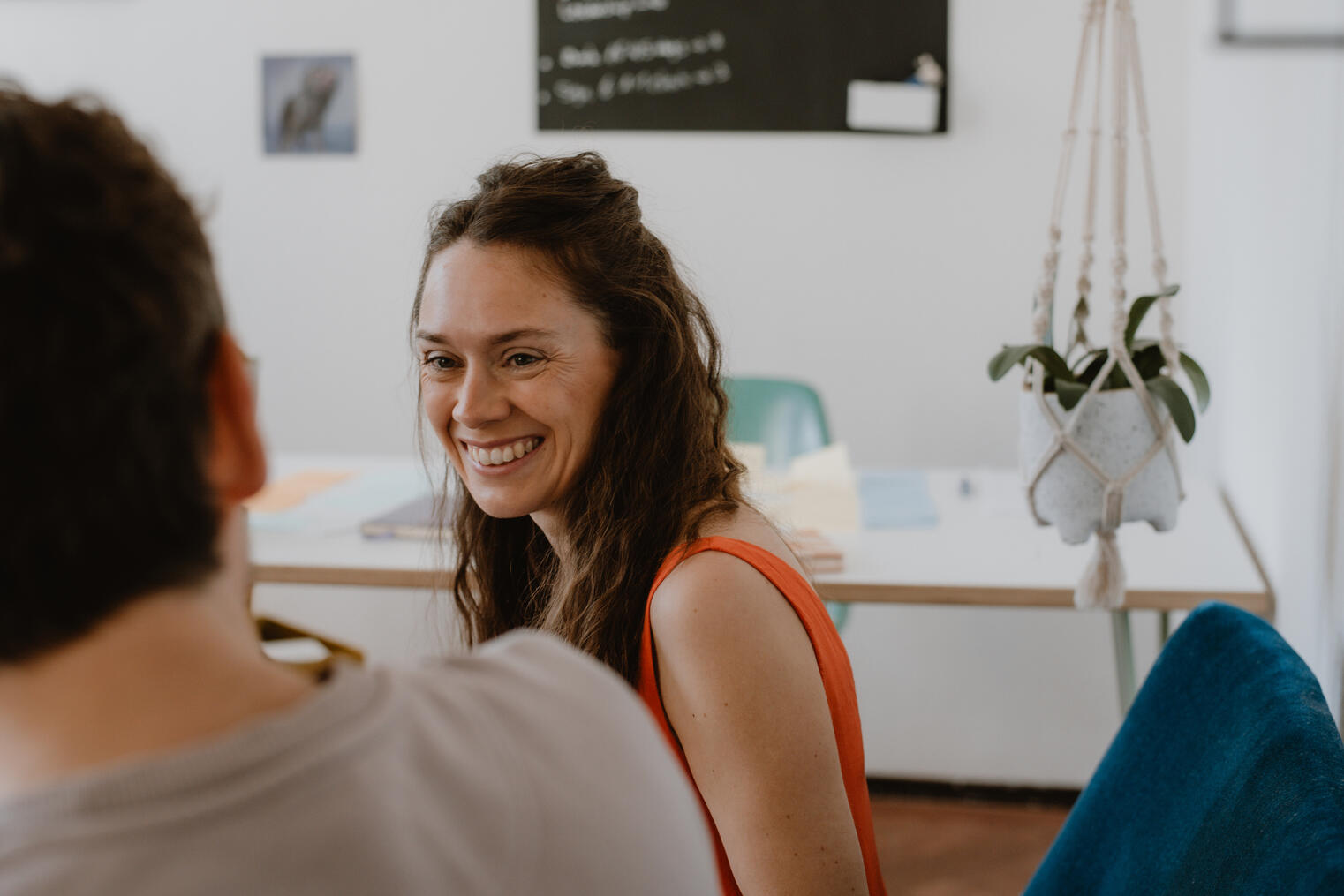
You want to succeed in your PhD but not sacrifice your health and happiness for it?
You want your PhD to be more than just a title - but you haven't figured out what "more" means for you and how to get it?
You're ready for the next step - but can't get yourself to write up and finish the thesis?
I got you!
I've been lost, overwhelmed and stuck in my PhD, too.
But then I figured out how to balance life and ambition - and finished my PhD in 4 years, with a first-author paper in Science and my dream job in my pocket.In my 1:1 coaching, I share all my strategies and tactics with you.So you, too, can thrive in your PhD and start building towards the career of your dreams.
Workshops and Trainings
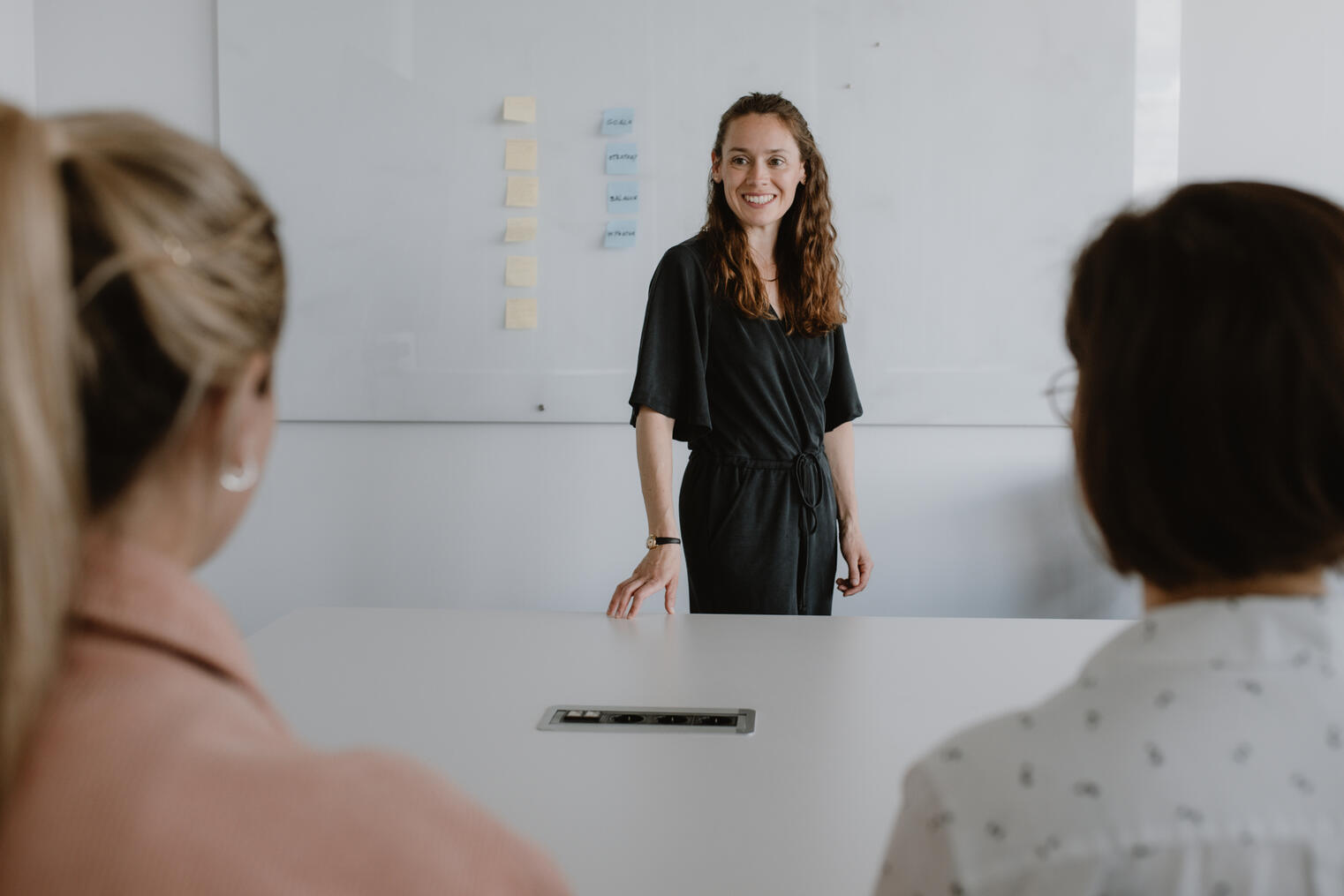
For the PhD students of today it is no longer sufficient to be a great scientist.
they need to be excellent project managers, science communicators, and leaders, too.
After 10 years as researcher, policy expert, consultant and founder, I know what skills are needed to design and lead a successful project, and to create results that make an impactIt is my mission to equip young scientists with those skills and to empower them to create and share research to advance science, create solutions for pressing societal problems, and boost their individual careers.
Short communications
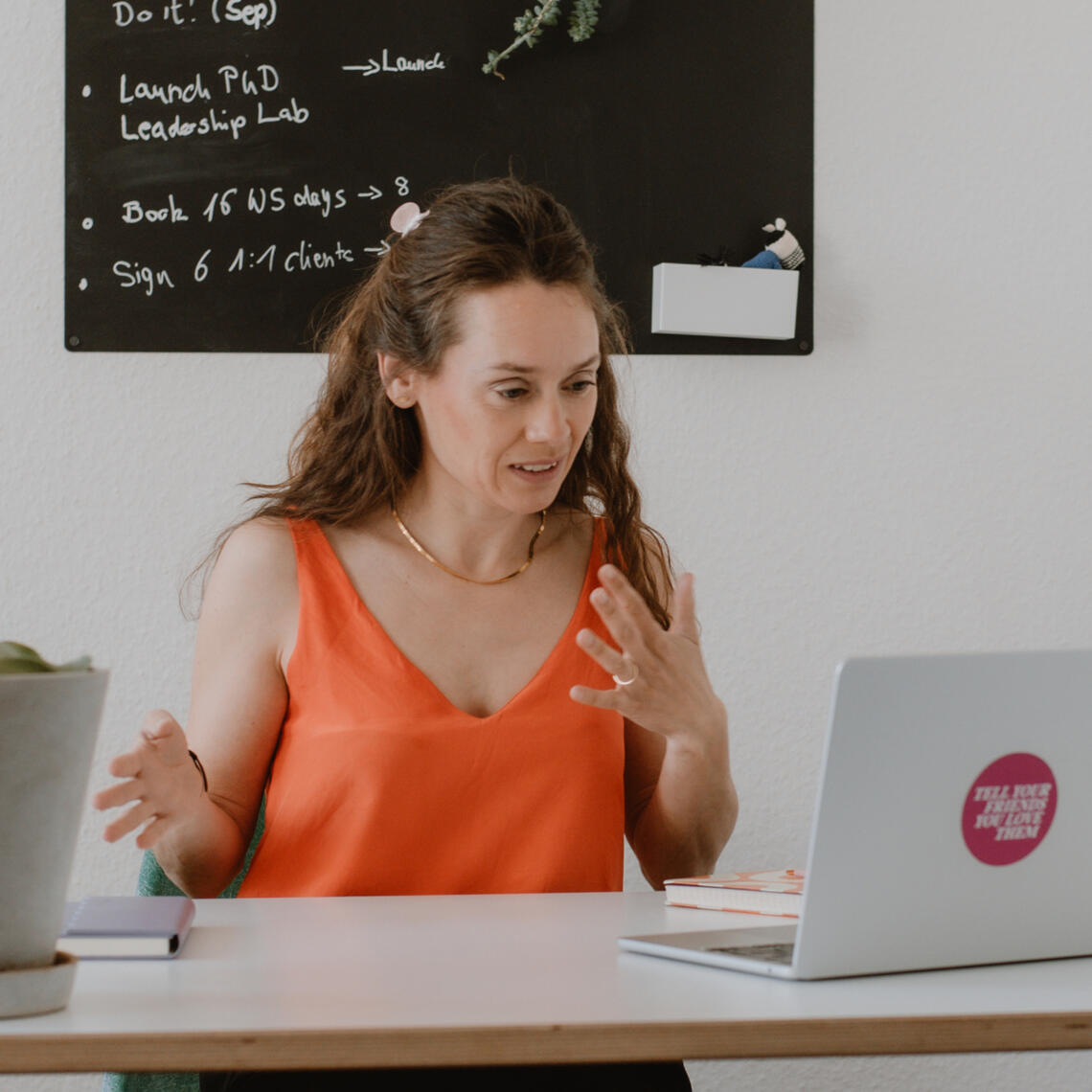
Some issues don't require an entire coaching program. One conversation can be enough to get you unstuck.That's where my coaching short comms come in:
Get the map: You want to submit a paper, a proposal or even your thesis but lack a clear action plan? Using the framework that helped me finish my PhD fast, without stress, and with a paper published in Science we will set up your personal roadmap to reach any milestone.
Oh my, PI: Your PI keeps dropping tasks on you that keep you from working on your priorities? They are micro-managing or never available? Together, we develop a strategy to get your PI to give you the support you need and frame it into a pitch they cannot resist.
Should I stay or should I go? Thinking about quitting the PhD? I've been there! Not an easy decision but it becomes lighter if you have some clarity about where you wanna go in life and your career - let's analyze your situation and come up with the next step that is best for YOU!
Writer's block buster: Need to write a draft but don't know where or how to start? I got you! With my step-by-step guidance you'll go from messy notes to a structured outline that will make the writing easy (and better ;)).
Client love

"Andrea's support gave me the motivation and accountability that I was missing from my supervision.
During the coaching, I finally developed a clear roadmap for my dissertation. Mapping out all the steps I needed to take until submission allowed me to see my progress and focus on moving forward. The regular meetings helped me stay on track instead of getting stuck in planning and uncertainty.At first, I was skeptical about whether the investment would be worth it - but now, I’m so glad I did it!Without Andrea, I would definitely still be far behind. Her coaching helped me channel my efforts into finishing my thesis, and even now, I can use the structure we created to guide me through the final stretch. I highly recommend working with her to anyone who wants to complete their PhD with clarity and focus!""Nilesh, PhD researcher in Psychology

“Andrea helped me find the courage to make a life changing decision that I was too scared to make and, therefore, was comfortably thinking about it as something my future self would deal with. Andrea doesn’t ask a lot of questions, but she asks the right ones.For me, it only took one to give me the courage to immediately chase the life I wanted: why not now?And for that, I’m truly grateful.”Isabel, CTO, PhD in Ecology

"I thought my situation might be too convoluted to benefit from coaching, but Andrea quickly and sharply grasped my situation and guided me toward clarity that I couldn’t attain when I was spinning my wheels on my own.I felt safe to explore and follow my internal signals in her gentle and compassionate presence."Bora, PhD researcher, Neuroscience

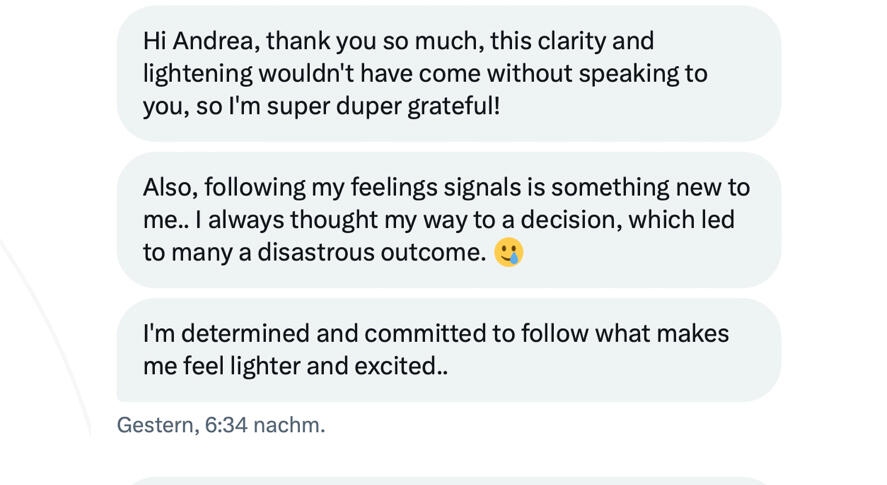
Coaching
I offer personal support to female early career scientists who want it all:
Success without burnout
Recognition and visibility for your accomplishments
A great career in academia or beyond
A life on your terms - with enough time and space for all the things that are important to you.
Programs
The Signature Program
Ph***ing Do it!
90-day PhD finisher's challenge
Struggling to finish your PhD?
This challenge and group coaching program is what you've been missing!
Create your step-by-step roadmap to submission
Solve bottlenecks in weekly group coaching sessions
Team up with other motivated PhD finishers and do the final sprint together
The successful start kit
Become the CEO of your PhD
Lead your PhD with confidence and poise.Six 1:1 coaching calls and hands-on exercises to help you take control over your PhD from day 1 - rather than leaving your career up to your PI.
The premium treatment
The effortless PhD
PhD, but make it easy.In ten 1:1 coaching sessions, you will get clear about your goals, realize what's possible for you and take the necessary steps to shape your PhD so it aligns with the life you want to live TODAY while becoming a step stone towards the career of your dreams.Successfully and effortlessly.
See for yourself!
Not sure if coaching is for you? Let's find out! Book your free 20 minute discovery call!
In-house workshops
I offer workshops for universities and graduate schools to support PhD researchers at every step of their journey.Whether they just started their PhD or are about to submit the thesis, whether they want to succeed in their academic career or thrive in industry - I have the right course for them.
I currently offer workshops on the following topics:
Time- and self-management for PhDs
Preparing effective presentations and posters
Scientific writing
Communication at the Science-Policy interface
How to create impact with your research
Networking for early career researchers
Getting started on LinkedIn
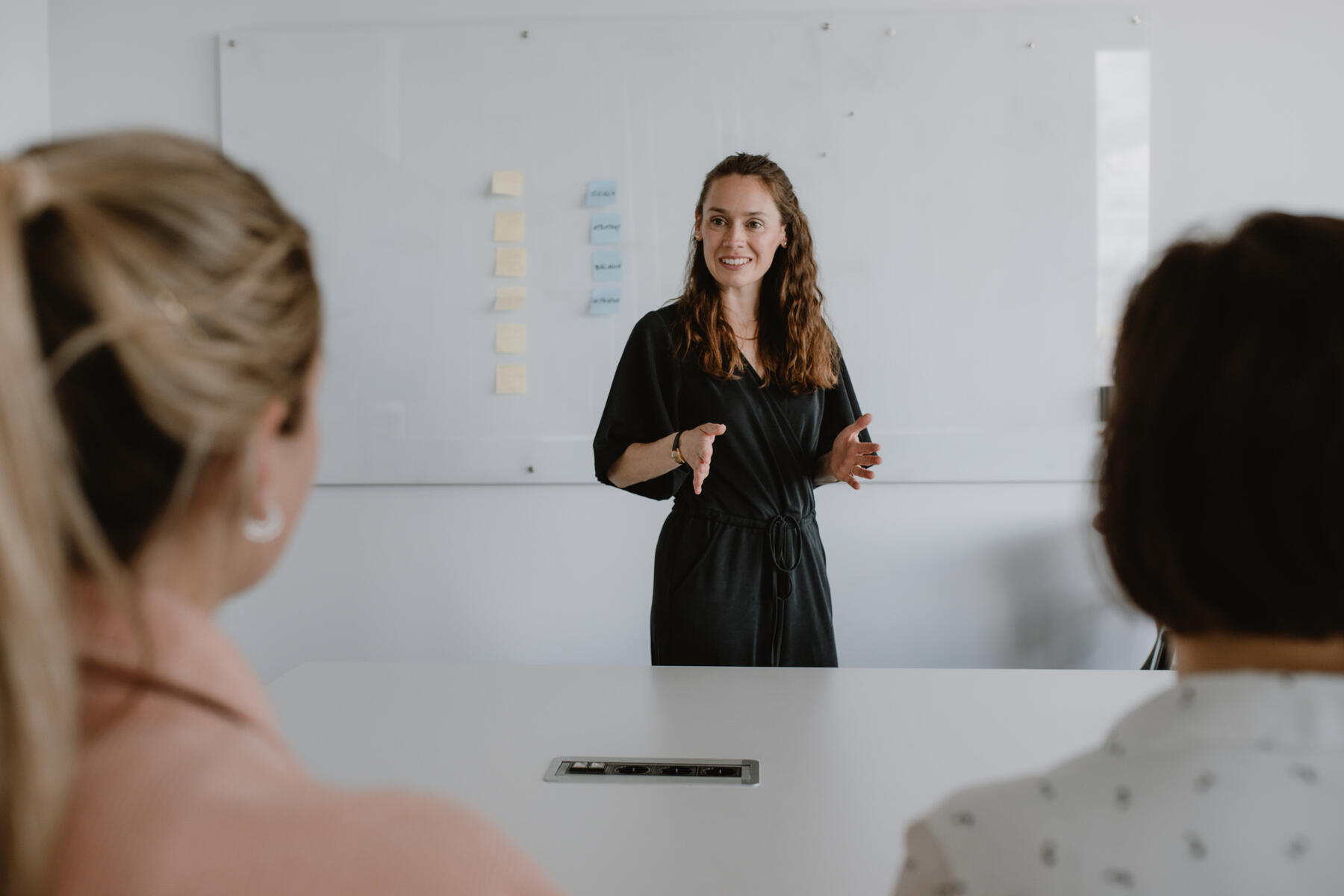
For more info please visit workshops.andreaperino.com or reach out to me via the contact form.
Get in Touch!
Have a question? Send us a message!
Lost in the PhD madness? Find your focus and get back on track - in five days.
A mini-course for PhDs who want to reach their goals with clarity and strategy - without adding more work
You know exactly that you're smart. But for some reason, you're stuck.You're mind is going back and forth between "I don't know what I should be doing" and "I'm putting in the work but I can't see progress - so obviously, I'm doing something wrong!"So, you
• get lost in tasks that don't get you closer to your goals
• can't see how far you've already come
• feel like you've lost control over your project
• can't find joy and motivation in your everyday work.
I got you!
The mini-course "From focus to clarity" helps you in 5 clear steps to
Rediscover your focus
Strategically decide your next steps
Go from feeling overwhelmed to being in the driver's seat
Target your energy to the right things, instead of trying to do everything.
Who is this for?
This course is for you if you...
are stuck in the messy middle of your PhD
regularly catch yourself thinking "I should do XYZ"
feel like you have to do everything at once
finally want to know what is the next most important thing
What's in it for you?
5 no-fluff, actionable modules (total of 2-3 hours of video lessons + PDF-Workbook)
Reflection questions, mini-challenges, strategic frameworks
IMPACT-Canvas to nail your focus and priorities
Bonus: Live-workshop „Plan your next 30 days“
All materials available for 6 months after purchase
What others say about the course
"Finally I know how to distinguish between essentials and the nice-to-have's!"
- Annika, Ecology, 1st year"The roadmap helped me in seeing how much ground I had already covered and what is still left to do.“
- Nilesh, Psychology, final year"It allowed me to reconnect with my work and regain motivation!"
- anonymous feedback
Limited time offer! Save your spot now at only 29 €
This is an early-bird offer that will go away soon. After that the price for this course will go up to 59 €
Frequently asked questions
What's the story behind the name WiSible?
It's no secret that despite all the efforts towards equality and all the small and big wins, we - women in general and women in science in particular - are still facing obstacles and hurdles that make it way harder for us to succeed than it is for (white, cis-) men. And the system that maintains all these inequalities isn't gonna change anytime soon.So, if we want to thrive, we have to find our own way through it.One that focuses on collaboration rather than competition.
Mindfulness rather than hustle culture.
Balance rather than burnout.With WiSible I want to empower women to find their way to success, in academia and beyond.Because we have a right to be here, we have a right to succeed, we have a right to be seen, and we have a right to thrive as scientists and humans.
Are you only helping women?
Generally, my programs are open for anyone who feels they will benefit from my experience and my style of coaching and teaching. Courses I teach at universities and research institutes are of course open to all genders.
That said, the programs I design for WISible are made for women.
With their struggles, their realities of having to juggle many responsibilities and their unique strengths.
I want women in science to thrive, I want us to be visible, and I want us to support each other. And I want WISible to be the go-to place for women to get what they need to reach their dreams.
What exactly happens in the courses?
I'll give you a typical scientist's answer: It depends.The cohort courses address the needs of PhD candidates at different points in their journey."Become the CEO of your PhD" is for graduate students who are still at the beginning of their PhD and who want to make sure they set up the project so it brings them closer to their future career goals. To make sure that happens, we cover topics such as project management, goal setting, negotiation tactics (so you can convince your supervisor to let you do the things you want to do), habits for success, mindfulness and sustainability, and strategic networking."Ph*ing Do it!" is all about finishing the PhD. It’s a 90-day challenge that you do together with other PhD candidates with the aim to submit the thesis by the end of the program. Here, we have an intensive kick-off week with calls and exercises where everyone works out their personal finisher’s roadmap. After that, we get on weekly calls where we celebrate successes and solve issues that came up along the way. It’s a mix of hands-on course, group coaching, and peer support. Individual coaching is also available for issues that can’t be solved in the group setting
The courses are a mix of theoretical input and interactive exercises during and between live calls. Every now and then there will be live hot seat coaching for some of you and there will always be room to exchange with your fellow participants.
For every course you will be assigned a buddy or a support group. The women you are connected with are your accountability partners, rooting for you and making sure you stay on track.
Most people will thrive with the resources and support provided in the group programs. But sometimes, you may run into issues that cannot be solved in the group. For those cases I reserve a limited number of slots for individual coaching.
How does PhD coaching work?
A colleague, psychiatrist and coach at Harvard Medical School once put it like this:“In psychotherapy, you follow the path of your tears. In coaching, you follow the path of your dreams”.That sums it up pretty well. Coaching is a future-oriented approach. It helps you pave the way forward and strengthens and supports you in achieving their goals.Importantly, in our 1:1 coaching relationship you are the boss. You bring the agenda and I follow your lead and support you to find solutions to your problems. I suggest a program as orientation but we can go off-script any time.
I’m interested in joining one of your programs but I can’t afford them. What can I do?
I get it.
Getting personal PhD support is not a small investment and it can feel crazy or impossible to spend so much money on coaching or a targeted course.But, I want you to consider this: Every month that you submit the PhD sooner, is a month where you will potentially earn more than you do now. Do the maths: How long would it take you to work in your dream job post graduation before the investment pays off? Probably it’s not that long.If you still feel, you cannot afford to work with me, please do have a close look at all the options I offer. If 1:1 coaching is not affordable for you right now, I’m convinced you’d still benefit a lot from one of the courses, and those are much more affordable. Plus, you get the added value of working in a peer group and connecting to likeminded PhDs.If you still feel, the investment is too big, get in touch with me. We can arrange monthly installments, we can discuss discounts if you convince a friend to join the course, too, and maybe there’s even the option that your university sponsors your participation. Let’s talk about it!
1 on 1 coaching
The effortless PhD
10 1:1 coaching sessions with full focus on creating your dream PhD.
You choose: Get my support for five months (2 sessions/month) or in weekly sessions.
Your investment: 2.500 €
About Me
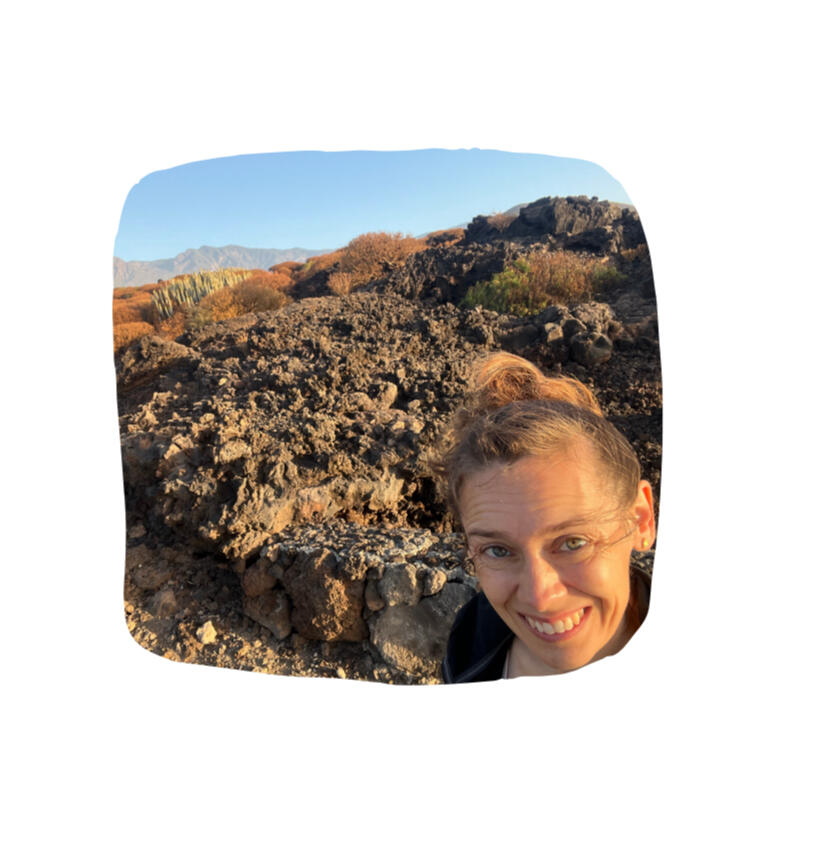
You know what you want in life.
A career that excites you and aligns with your values.
Enough time for your friends, family and yourself.
Success.And sometimes you wonder how doing a PhD fits into that. It just feels like the opposite of what you want so often!I know. I've been there.
I started my PhD even though I knew I didn't want to be a scientist. I'd much rather become a science journalist but unfortunately, all my applications were rejected. So I thought to myself if I can't have what I want I'll do this PhD. At least I'll get to write and do fieldwork in a nice sunny place, and I'll be free in organizing my daily work.So I thought.But turns out, Portugal isn't that sunny, my writing often stalled because I didn't get feedback from my advisor or my co-authors, work hours were long and my paper got desk rejected.
Instead of feeling relaxed, in charge and successful, I was stressed and frustrated pretty often. And worst of all, I didn't know WHY I was doing all that to myself. I didn't have a vision for my life after the PhD (I still didn't want to be a scientist) and my motivation hit rock bottom.Then, I found this job I really, really wanted. But, to be qualified, I needed a PhD.
6 months later I had
• the job
• my first chapter published in Science
• submitted my dissertationAll while being in a relationship, hanging out with friends, taking my pony on rides and going on four-week holidays every year.
How did I do that?
• I found my "why"
• I created an efficient system to manage my project
• I asked for supportI believe with all my heart that if you have these three things you can succeed in anything you put your mind to.
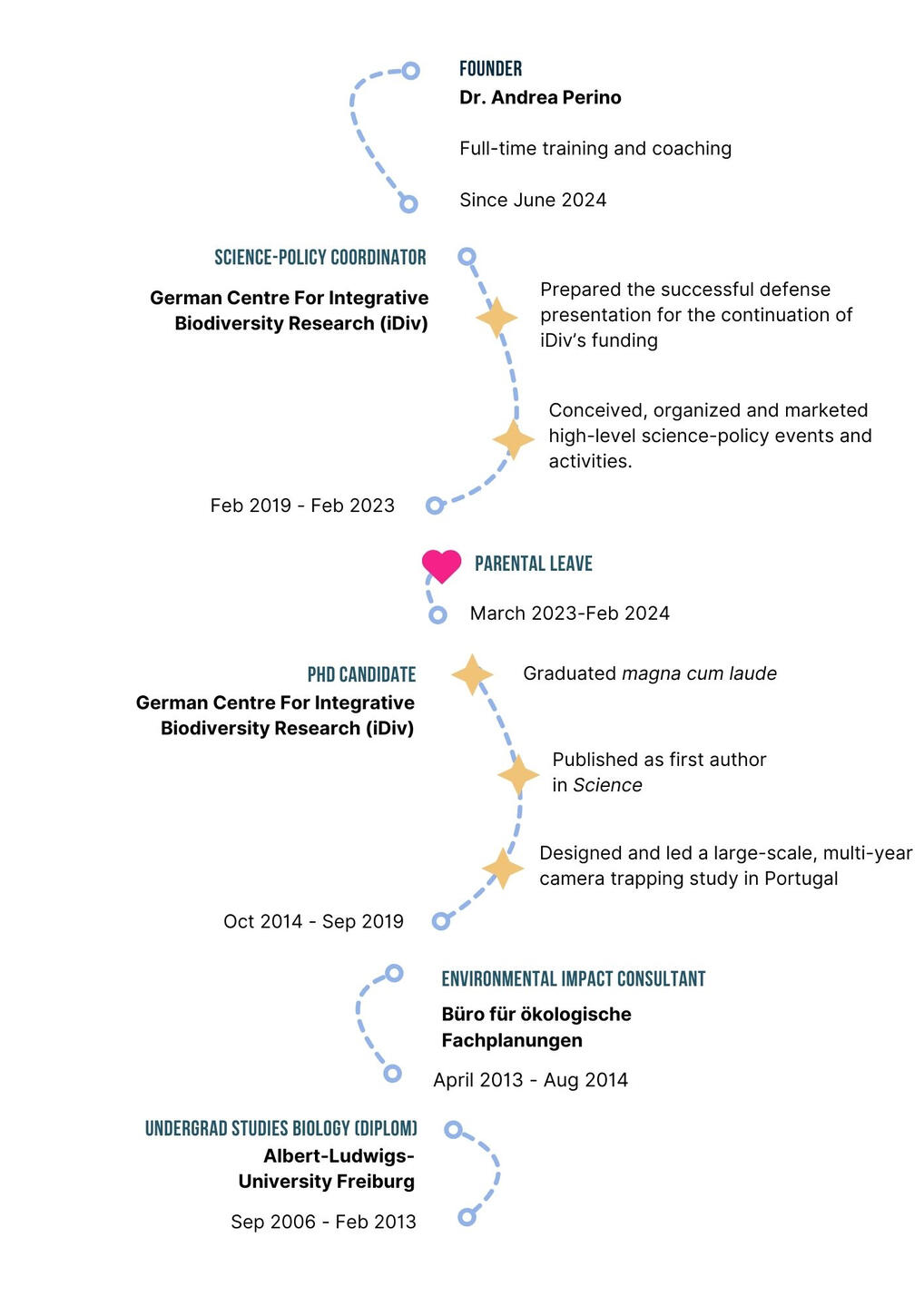
That's why I created WiSible
To walk with you on your path to the career of your dreams.Whatever that may mean for you.
Imprint and Data Protection
Dr. Andrea Perino
Zschochersche Str. 10
04177 Leipzig
+49 (0)176/57852714
hello@andreaperino.com
USt-IdNr.: DE369166759
Haftung für Inhalte
Als Diensteanbieter sind wir gemäß § 7 Abs.1 DDG für eigene Inhalte auf diesen Seiten nach den allgemeinen Gesetzen verantwortlich. Wir als Diensteanbieter sind jedoch nicht verpflichtet, übermittelte oder gespeicherte fremde Informationen zu überwachen oder nach Umständen zu forschen, die auf eine rechtswidrige Tätigkeit hinweisen. Verpflichtungen zur Entfernung oder Sperrung der Nutzung von Informationen nach den allgemeinen Gesetzen bleiben hiervon unberührt. Eine diesbezügliche Haftung ist jedoch erst ab dem Zeitpunkt der Kenntnis einer konkreten Rechtsverletzung möglich. Bei Bekanntwerden von entsprechenden Rechtsverletzungen werden wir diese Inhalte umgehend entfernen.
Haftung für Links
Unser Angebot enthält Links zu externen Webseiten Dritter, auf deren Inhalte wir keinen Einfluss haben. Deshalb können wir für diese fremden Inhalte auch keine Gewähr übernehmen. Für die Inhalte der verlinkten Seiten ist stets der jeweilige Anbieter oder Betreiber der Seiten verantwortlich. Die verlinkten Seiten wurden zum Zeitpunkt der Verlinkung auf mögliche Rechtsverstöße überprüft. Rechtswidrige Inhalte waren zum Zeitpunkt der Verlinkung nicht erkennbar. Eine permanente inhaltliche Kontrolle der verlinkten Seiten ist jedoch ohne konkrete Anhaltspunkte einer Rechtsverletzung nicht zumutbar. Bei Bekanntwerden von Rechtsverletzungen werden wir derartige Links umgehend entfernen.DATENSCHUTZERKLÄRUNGName und Anschrift des Verantwortlichen:
Dr. Andrea Perino
Zschochersche Straße 10
04177 Leipzig
0176/57852714
hello@andreaperino.com
www.andreaperino.comDer Verantwortliche im Sinne der EU-Datenschutz-Grundverordnung sowie sonstiger datenschutzrechtlicher Bestimmungen ist:WIR RESPEKTIEREN IHRE DATEN!
Wir freuen uns über Ihr Interesse an unserem Internetauftritt. Das Vertrauen aller Besucher und Kunden, die Sicherheit Ihrer Daten und der Schutz Ihrer Privatsphäre sind für uns von zentraler Bedeutung. Ihre personenbezogenen Daten werden von uns daher gemäß den gültigen gesetzlichen Datenschutzvorschriften und dieser Datenschutzerklärung behandelt. Personenbezogene Daten sind Informationen, die dazu genutzt werden können, um Ihre Identität zu erfahren, wie beispielsweise Ihr richtiger Name, Ihre Adresse oder Ihre Telefonnummer.
Wenn Sie unsere Seite ansehen und benutzen, ohne sich zu registrieren oder uns anderweitig ausdrücklich Informationen zu übermitteln, verarbeiten wir die Daten, die uns mit jeder Anfrage Ihres Browsers übermittelt werden (siehe unten „Protokoll-Daten). Sofern Sie uns ausdrücklich personenbezogene Daten übermitteln erfolgt dies ausschließlich zweckgebunden an die Anfrage bzw. den jeweiligen Auftrag. Wir weisen Sie darauf hin, dass die Datenübertragung im Internet nie vollständig gegen einen Zugriff durch Dritte geschützt werden kann.Nachfolgend möchten wir Ihnen näher erläutern, welche Daten wir wann und zu welchem Zweck verarbeiten. Es wird erklärt, wie unsere angebotenen Dienste arbeiten und wie hierbei der Schutz Ihrer personenbezogenen Daten gewährleistet wird.RECHTSGRUNDLAGE FÜR DIE VERARBEITUNG PERSONENBEZOGENER DATEN
Sofern wir für Verarbeitungsprozesse personenbezogener Daten eine Einwilligung der betroffenen Person einholen, dient Art. 6 Abs. 1 lit. a DSGVO als Rechtsgrundlage.
Für die Verarbeitung von personenbezogenen Daten, die zur Erfüllung eines Vertrages, dessen Vertragspartei die betroffene Person ist, erforderlich ist, dient Art. 6 Abs. 1 lit. b DSGVO als Rechtsgrundlage. Dies gilt auch für Verarbeitungsvorgänge, die zur Durchführung vorvertraglicher Maßnahmen erforderlich sind.
Sofern eine Verarbeitung personenbezogener Daten zur Erfüllung einer rechtlichen Verpflichtung erforderlich ist, der unser Unternehmen unterliegt, dient Art. 6 Abs. 1 lit. c DSGVO als Rechtsgrundlage.
Für den Fall, dass lebenswichtige Interessen der betroffenen Person oder einer anderen natürlichen Person eine Verarbeitung personenbezogener Daten erforderlich machen, dient Art. 6 Abs. 1 lit. d DSGVO als Rechtsgrundlage.
Ist die Verarbeitung zur Wahrung eines berechtigten Interesses unseres Unternehmens oder eines Dritten erforderlich und überwiegen die Interessen, Grundrechte und Grundfreiheiten des Betroffenen das erstgenannte Interesse nicht, so dient Art. 6 Abs. 1 lit. f DSGVO als Rechtsgrundlage für die Datenverarbeitung.DATENLÖSCHUNG UND SPEICHERDAUER
Die personenbezogenen Daten der betroffenen Person werden gelöscht, sobald der Zweck der Speicherung entfällt. Eine Speicherung kann darüber hinaus erfolgen, wenn dies durch europäische oder nationale Gesetze oder sonstigen Vorschriften, denen der Verantwortliche unterliegt, vorgesehen wurde. Eine Sperrung oder Löschung der Daten erfolgt auch dann, wenn eine durch die genannten Vorschriften vorgeschriebene Speicherfrist abläuft, es sei denn, dass eine Erforderlichkeit zur weiteren Speicherung der Daten für einen Vertragsabschluss oder eine Vertragserfüllung besteht.IHRE RECHTE
Sie haben ein Recht auf unentgeltliche Auskunft über die bei uns zu Ihrer Person gespeicherten Daten sowie ggf. ein Recht auf Berichtigung, Einschränkung der Verarbeitung oder Löschung dieser Daten. Ebenfalls haben Sie das Recht auf Datenübertragbarkeit. Schließlich haben Sie auch das Recht, sich über die Verarbeitung Ihrer persönlichen Daten durch uns bei der Datenschutz-Aufsichtsbehörde zu beschweren.Wir weisen Sie zudem darauf hin, dass Sie der künftigen Verarbeitung Ihrer personenbezogenen Daten entsprechend den gesetzlichen Vorgaben gem. Art. 21 DSGVO zu jeder Zeit widersprechen können. Der Widerspruch kann insbesondere gegen die Verarbeitung für Zwecke der Direktwerbung erfolgen.ERTEILUNG VON AUSKÜNFTEN
Bei Fragen zur Erhebung, Verarbeitung oder Nutzung Ihrer personenbezogenen Daten, für Auskünfte, für die Berichtigung, Sperrung oder Löschung von Daten sowie zum Widerruf ggf. erteilter Einwilligungen oder zum Widerspruch gegen eine bestimmte Datenverwendung wenden Sie sich bitte unter Verwendung der folgenden E-Mail-Adresse an uns: hello@andreaperino.comPROTOKOLL-DATEN
Die automatische Erhebung und Speicherung von Protokoll-Daten durch den Anbieter der Internetdienste (Provider) erfolgt, weil die Verarbeitung dieser Daten technisch erforderlich ist, um Ihnen unsere Internetseite anzuzeigen sowie die Stabilität und Sicherheit zu gewährleisten. Die Protokoll-Daten umfassen folgende Informationen:
• Datum und Uhrzeit der jeweiligen Anfrage
• Internetadresse (URL), die angefragt wurde
• URL, die der Besucher unmittelbar zuvor besucht hat
• Verwendeter Browser und Sprache
• Verwendetes Betriebssystem und dessen Oberfläche
• IP-Adresse und Hostname des Besuchers
• Zugriffsstatus / http-Statuscode
• Jeweils übertragenen Datenmenge
Die Übermittlung dieser Daten an uns erfolgt automatisch und können Ihrer Person mit verhältnismäßigen Aufwand nicht zugeordnet werden. Rechtsgrundlage der Verarbeitung dieser Daten ist unser berechtigtes Interesse gemäß Art. 6 Absatz 1 Satz 1 lit. f DSGVO, denn diese Datenverarbeitungen sind zum Betrieb und zur Anzeige der Webseite notwendig. Die Daten werden gelöscht, sobald sie für die Erreichung des Zweckes ihrer Erhebung nicht mehr erforderlich sind. Im Falle der Erfassung der Daten zur Bereitstellung der Website ist dies der Fall, wenn die jeweilige Sitzung beendet ist. Die Erfassung der Daten zur Bereitstellung der Website und die Speicherung der Daten in Logfiles ist für den Betrieb der Internetseite zwingend erforderlich. Es besteht folglich seitens des Nutzers keine Widerspruchsmöglichkeit.COOKIES
Um den Besuch unserer Website attraktiv zu gestalten und die Nutzung bestimmter Funktionen zu ermöglichen, verwenden wir sogenannte Cookies. Hierbei handelt es sich um kleine Textdateien, die auf Ihrem Endgerät gespeichert werden und die bestimmte Informationen zum Austausch mit unserem System speichern. Rechtsgrundlage der Verarbeitung dieser Daten ist Art. 6 Absatz 1 Satz 1 lit. f DSGVO. Einige der von uns verwendeten Cookies werden nach Ende der Browser-Sitzung, also nach Schließen des Browsers, wieder gelöscht (transient Cookies). Zu diesen zählen insbesondere Sitzungs- oder Session-Cookies. Diese speichern einen eindeutigen Bezeichner (Session-ID). Durch diese Session-ID können verschiedene Anfragen Ihres Browsers einer gemeinsamen Sitzung zugeordnet werden. Hierdurch kann Ihr Endgerät wiedererkannt werden, wenn während einer Sitzung auf unsere Internetseite zurückkehren. Session-Cookies werden auch schon dann gelöscht, wenn Sie sich ausloggen.
Andere Cookies verbleiben für eine vorgegebene Dauer auf Ihrem Endgerät und ermöglichen uns, Ihren Browser bzw. Ihr Endgerät beim nächsten Besuch wiederzuerkennen (persistente Cookies).
Bitte beachten Sie, dass bestimmte Cookies bereits gesetzt werden, sobald Sie unsere Website betreten. Sie können Ihren Browser so einstellen, dass Sie über das Setzen von Cookies informiert werden und einzeln über deren Annahme entscheiden oder die Annahme von Cookies für bestimmte Fälle, insbesondere Cookies von Drittanbietern (Third Party Cookies) oder generell ausschließen können. Bei der Nichtannahme von Cookies kann die Funktionalität unserer Website für Sie eingeschränkt sein.KONFIGURATION DER COOKIE-EINSTELLUNGEN IM BROWSER
Sie haben die Möglichkeit, das Abspeichern von Cookies auf Ihrem Rechner durch entsprechende Browsereinstellungen zu verhindern. Jeder Browser unterscheidet sich in der Art, wie er die Cookie-Einstellungen verwaltet. Diese ist in dem Hilfemenü jedes Browsers beschrieben, welches Ihnen erläutert, wie Sie Ihre Cookie-Einstellungen ändern können. Diese finden Sie für die jeweiligen Browser unter den folgenden Links:
Internet Explorer™: http://windows.microsoft.com/de-DE/windows-vista/Block-or-allow-cookies
Safari™:
https://support.apple.com/de-de/guide/safari/ibrw850f6c51/18.0/mac/15.0
Chrome™: http://support.google.com/chrome/bin/answer.py?hl=de&hlrm=en&answer=95647
Firefox™ https://support.mozilla.org/de/kb/cookies-erlauben-und-ablehnen
Opera™: http://help.opera.com/Windows/10.20/de/cookies.htmlVERSCHLÜSSELUNG DURCH SSL
Aus Sicherheitsgründen benutzt unsere Website eine SSL-Verschlüsselung (Secure Sockets Layer). Damit werden übertragene Daten geschützt und können nicht von Dritten gelesen werden. Sie können eine erfolgreiche Verschlüsselung daran erkennen, dass sich die Protokollbezeichnung im der Statusleiste des Browsers von "http://" in "https://" ändert und dass dort ein geschlossenes Schloss-Symbol sichtbar ist.WEBHOSTING
Wir nutzen die Dienste der Namecheap, Inc.4600 East Washington Street, Suite 300, Phoenix, AZ 85034, USA zum Webhosting für unsere Webseiten und haben dazu einen Vertrag zur Auftragsverarbeitung gemäß Art. 28 DSGVO mit namecheap, Inc. abgeschlossen.Weitere Informationen erhalten Sie in der Datenschutzerklärung von namecheap, Inc. unter https://www.namecheap.com/legal/general/privacy-policy/Rechtsgrundlage
Die Rechtsgrundlage der Verarbeitung dieser Daten ist unser berechtigtes Interesse des Betriebes und Erhalt der Betriebssicherheit dieser Webseiten gemäß Art. 6 Absatz 1 Lit. f DSGVO.NEWSLETTER VERSAND
Zur Versendung unseres Newsletters nutzen wir die Dienste der Kit Inc., 750 West Bannock Street #761, Boise, Idaho 83701-0761.
Wenn Sie unseren E-Mail-Newsletter abonnieren und regelmäßig lesen möchten, ist Ihre Registrierung mit einer gültigen E-Mail-Adresse und damit eine Einwilligung Ihrerseits in die Verarbeitung Ihrer personenbezogenen Daten durch uns erforderlich. Beachten Sie hierzu die Einwilligungserklärung auf dem Formular zur Registrierung für den Newsletter.
Vor Versand des Newsletters müssen Sie uns im Rahmen des sogenannten Double-Opt-In- Verfahrens ausdrücklich bestätigen, dass wir für Sie den E-Mail-Newsletter-Dienst aktivieren sollen. Dies tun wir, um zu vermeiden, dass fremde E-Mail-Adressen für Anmeldungen genutzt werden. Dazu erhalten Sie von uns eine Bestätigungs- und Autorisierungs-E-Mail, mit der wir Sie bitten, den in dieser E-Mail enthaltenen Link anzuklicken und uns damit zu bestätigen, dass Sie unseren Newsletter erhalten möchten. Erfolgt keine Bestätigung Ihrerseits werden Ihre personenbezogenen Daten innerhalb von 7 Tagen gelöscht.
Im Zusammenhang mit der Anmeldung werden neben der E-Mail-Adresse auch der Anmeldezeitpunkt, der Bestätigungszeitpunkt, die IP-Adresse sowie der Einwilligungstext gespeichert und wir benutzen die E-Mail-Adresse ausschließlich für die Zustellung des Newsletters, sofern Sie einer anderen Benutzung nicht ausdrücklich zugestimmt haben.
Diese Daten werden auf den Servern der Kit Inc. gespeichert.
Über kleine, „unsichtbare“ Dateien (Beacons), die mit dem Newsletter versandt werden, können verschiedene Auswertungen zur Verbesserung unserer Angebote erfolgen. Dabei werden IP-Adresse, Browser sowie Zeitpunkt des Abrufs und der Öffnung des Newsletters und das Klickverhalten auf im Newsletter enthaltene Links erfasst und statistisch ausgewertet.
Wir weisen darauf hin, dass die Möglichkeit besteht, dass Daten in die USA übertragen und durch US-Behörden verarbeitet werden.
Kit Inc. ist aber nach dem EU-US Data Privacy Framework zertifiziert. Eine Datenübertragung in die USA wird daher derzeit als ausreichend sicher betrachtet.
Wir haben zum Schutz Ihrer Daten mit Kit Inc. ein Data Processing Agreement entsprechend einem Vertrag zur Auftragsverarbeitung gemäß Art. 28 DSGVO abgeschlossen.Weitere Informationen erhalten Sie unter: https://kit.com/gdprRechtsgrundlage
Der Versand des Newsletters erfolgt auf Grundlage einer Einwilligung der Empfänger gem. Art. 6 Abs. 1 Lit. a DSGVO.
Die Analyse der Öffnungs- und Klickraten erfolgt auf Grundlage unseres berechtigten Interesses gem. Art. 6 Abs. 1 Lit. f DSGVO. Unser Interesse ist es, möglichst passende Angebote für unsere Nutzer zu erstellen und dies durch die Analyse des Nutzerverhaltens zu erreichen sowie fortlaufend zu optimieren.TERMINVEREINBARUNG ÜBER CALENDLY
Um Ihnen den modernen Service einer vereinfachten Online-Terminbuchung anbieten zu können, verwenden wir die Dienste der Calendly LLC, BB&T Tower, 271 17th St NW, Atlanta, GA 30363, USA (Nachfolgend "Calendly").
Bei Verwendung von Calendly werden browserspezifische Daten sowie ihre IP-Adresse an Calendly übertragen.
Durch Anklicken des Buttons "Termin buchen" werden zudem ihre personenbezogenen Daten wie Name, E-Mail-Adresse und sonstige durch Sie angegeben Daten an Calendly übertragen.
Über die weitere Verarbeitung und über die Dauer der Speicherung haben wir keine Kenntnis.
Wir weisen darauf hin, dass die Möglichkeit besteht, dass Daten in die USA übertragen und durch US-Behörden verarbeitet werden.
Calendly ist aber nach dem EU-US Data Privacy Framework zertifiziert. Eine Datenübertragung in die USA wird daher derzeit als ausreichend sicher betrachtet.
Wir haben zum Schutz Ihrer Daten mit Calendly ein Data Processing Agreement entsprechend einem Vertrag zur Auftragsverarbeitung gemäß Art. 28 DSGVO abgeschlossen.
Weiterhin weisen wir darauf hin, dass Sie nicht verpflichtet sind, diesen Dienst zur Vereinbarung eines Termins zu nutzen. Wenn Sie dies nicht möchten, nutzen Sie bitte eine andere der angebotenen Kontaktmöglichkeiten zur Terminvereinbarung.
Weitere Informationen hierzu finden Sie in der Datenschutzerklärung von Calendly unter https://calendly.com/de/pages/privacy sowie unter https://help.calendly.com/hc/de/articles/360007032633-DSGVO-FAQsRechtsgrundlage
Die Rechtsgrundlage für die Verwendung der Calendly Termine-Onlinebuchung ist Ihre Einwilligung gem. Art. 6 Abs. 1 Lit. a DSGVO.
GOOGLE ANALYTICS
Diese Webseite benutzt Google Analytics, einen Webanalysedienst der Google Ireland Limited, Gordon House, Barrow Street, Dublin 4, Ireland („Google“). Google Analytics verwendet sog. „Cookies“, Textdateien, die auf Ihrem Computer gespeichert werden und die eine Analyse der Benutzung der Webseite durch Sie ermöglichen. Die durch das Cookie erzeugten Informationen über Ihre Benutzung dieser Webseite werden in der Regel an einen Server von Google in den USA übertragen und dort gespeichert. Die USA gelten laut DSGVO als Drittstaat mit unsicherem Datenschutzniveau.
Im Falle der Aktivierung der IP-Anonymisierung auf dieser Webseite wird Ihre IP-Adresse von Google jedoch innerhalb von Mitgliedstaaten der Europäischen Union oder in anderen Vertragsstaaten des Abkommens über den Europäischen Wirtschaftsraum zuvor gekürzt. Nur in
Allgemeine Geschäftsbedingungen
English version below.
In the event of a dispute, the German version applies exclusively. The translation is used only for our customers to understand.
Book your 60 minute 1:1 coaching call
Upon clicking the link, you will be redirected to the Stripe website where you can do the booking. As soon as I receive your booking I will reach out with suggestions for call dates.










